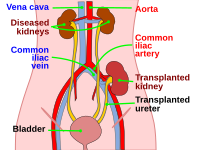
Photo from wikipedia
Rates and modulators of SARS‐CoV‐2 vaccine nonresponse and breakthrough infections remain unclear in serially vaccinated transplant recipients. In a prospective, mono‐centric, observational study, 1878 adult solid organ and hematopoietic cell… Click to show full abstract
Rates and modulators of SARS‐CoV‐2 vaccine nonresponse and breakthrough infections remain unclear in serially vaccinated transplant recipients. In a prospective, mono‐centric, observational study, 1878 adult solid organ and hematopoietic cell transplant recipients, with prior SARS‐CoV‐2 vaccination, were included between March 2021 and February 2022. SARS‐CoV‐2 anti‐spike IgG antibodies were measured at inclusion and details on SARS‐CoV‐2 vaccine doses and infection were collected. No life‐threatening adverse events were reported after a total of 4039 vaccine doses. In transplant recipients without prior SARS‐CoV‐2 infection (n = 1636), antibody response rates ranged widely, from 47% in lung transplant to 90% in liver transplant and 91% in hematopoietic cell transplant recipients after third vaccine dose. Antibody positivity rate and levels increased after each vaccine dose in all types of transplant recipients. In multivariable analysis, older age, chronic kidney disease and daily dose of mycophenolate and corticosteroids were negatively associated with antibody response rate. Overall rate of breakthrough infections was 25.2% and mainly (90.2%) occurred after third and fourth vaccine dose. Lung transplant recipients had the highest rates of severe breakthrough infection (10.5%) and death (2.5%). In multivariable analysis, older age, daily dose of mycophenolate and corticosteroids were associated with severe breakthrough infection. Transplant recipients with infection before first vaccine dose (n = 160) had higher antibody response rates and levels after each vaccine dose, and a significantly lower overall rate of breakthrough infections compared to those without prior infection. Antibody response after SARS‐CoV‐2 vaccination and rate of severe breakthrough infections vary largely between different transplant types and are modulated by specific risk factors. The observed heterogeneity supports a tailored approach against COVID‐19 in transplant recipients.
Journal Title: Journal of Medical Virology
Year Published: 2023
Link to full text (if available)
Share on Social Media: Sign Up to like & get
recommendations!